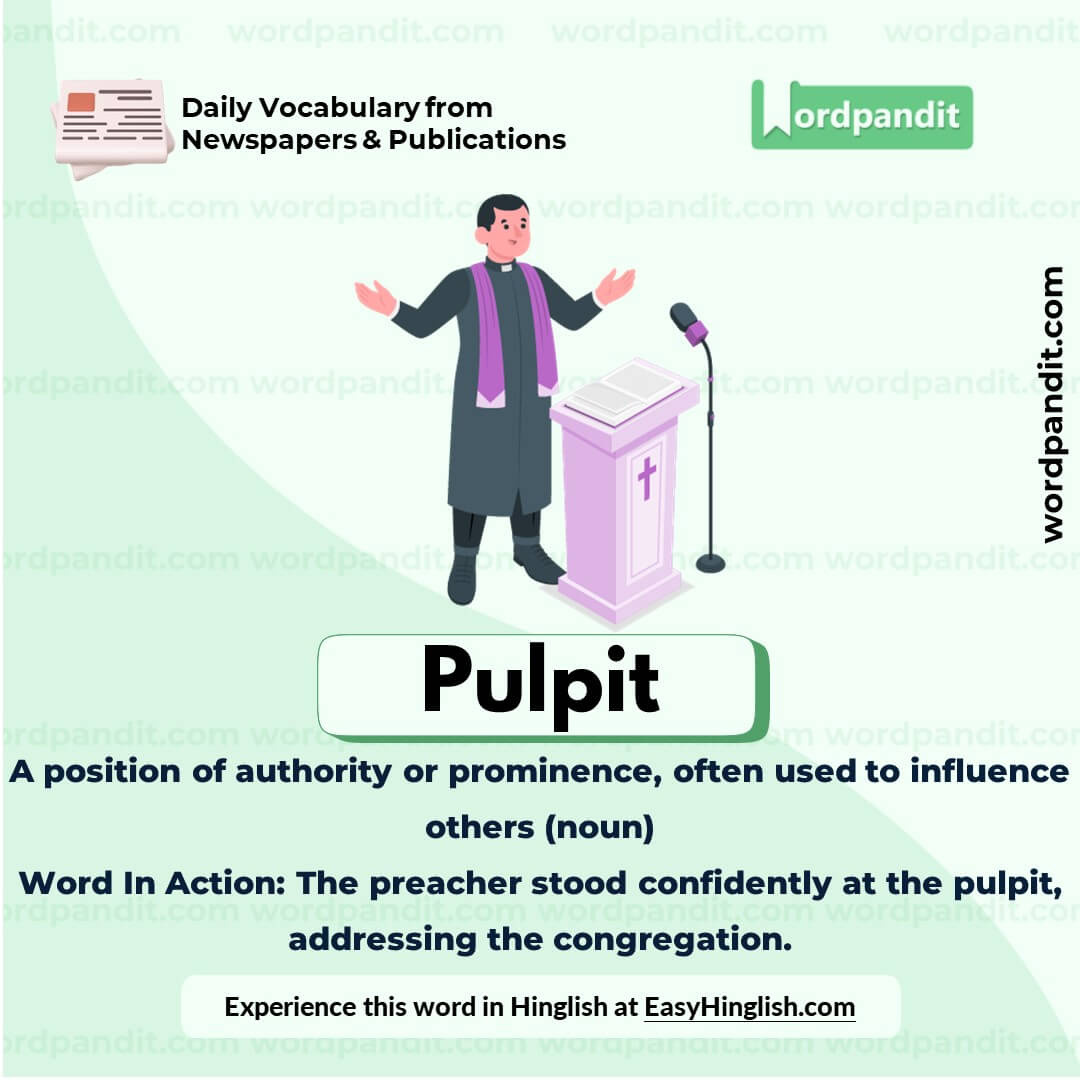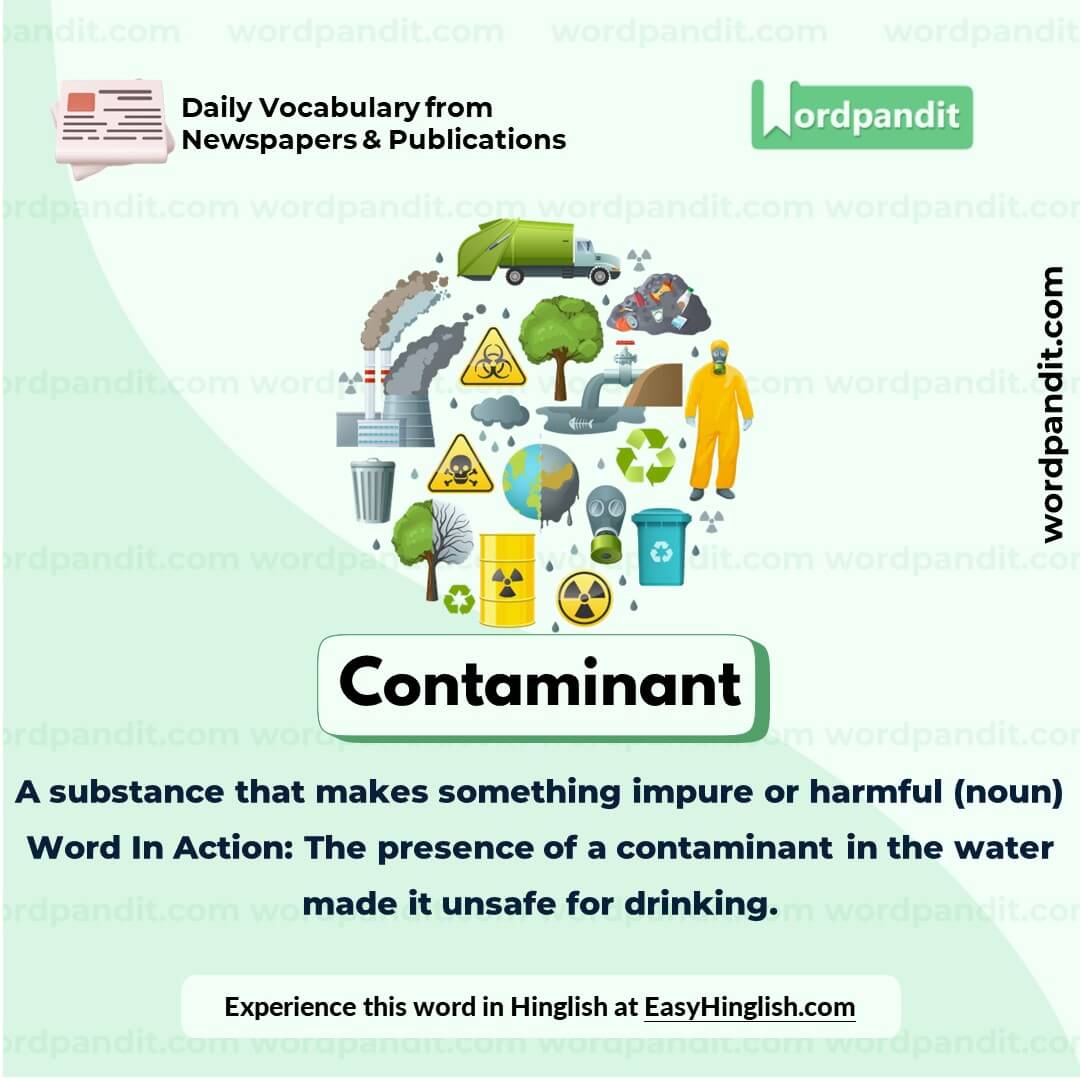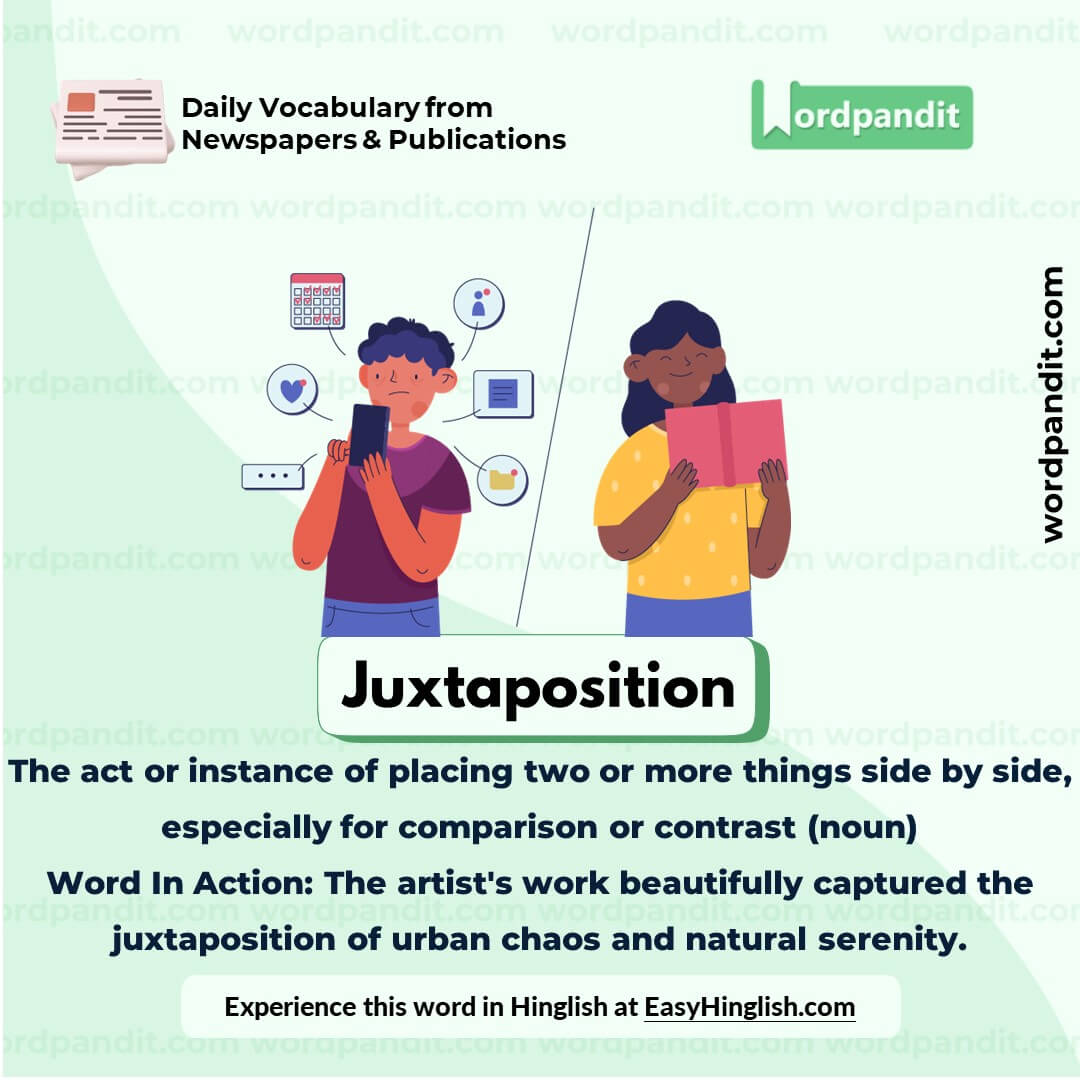Daily Vocabulary from International Newspapers and Publications
Expand Your Vocabulary with Wordpandit’s Global Vocabulary Hub
At Wordpandit, we are committed to helping you develop a truly global vocabulary by drawing from some of the most respected international publications. This section is designed to keep you ahead of the curve by introducing you to words that define global conversations and trends.
The Power of Global Sources
To help you think and communicate on a global scale, we curate vocabulary from renowned international sources, such as:
- The New York Times
- The Washington Post
- BBC
- The Guardian
- The Economist
- Scientific American
- Psychology Today
- And many more...
Stay Global, Stay Competitive
Our daily updates from international publications ensure you are consistently exposed to new words that reflect global news and developments, making sure your vocabulary is not only current but also globally relevant.
Enhance Your Global Perspective
Whether you’re preparing for international exams, aiming to excel in global business communication, or want to enhance your language skills for personal growth, Wordpandit offers the resources you need to thrive in a global context.
Effective Learning, Global Reach
Our learning methodology combines global examples, memory aids, and interactive activities, allowing you to internalize new words effectively and apply them in real-world scenarios.
Begin Your Global Vocabulary Journey Now!
Why Choose Wordpandit?
Practical Learning: Focus on words you'll actually encounter in real-world reading, enhancing your comprehension and communication skills.
Diverse Content: From current affairs to scientific breakthroughs, our varied sources expose you to vocabulary across multiple domains.
Effortless Integration: Make Wordpandit a part of your daily routine. Just a few minutes each day can significantly boost your lexicon over time.
Your Path to Vocabulary Mastery
- Visit our Daily Vocabulary section regularly
- Explore new words and their usage in context
- Practice incorporating these words into your own writing and speech
- Track your progress as your vocabulary expands
Start Your Journey Today
Embark on your vocabulary enhancement journey with Wordpandit. By consistently engaging with our daily posts, you'll build a robust vocabulary that serves you well in academic, professional, and personal contexts.
Remember, a word a day keeps linguistic limitations at bay. Make Wordpandit your daily companion in the quest for vocabulary excellence!
WORD-1: Pulpit
Context:
"If confirmed by the Senate, the trio of doctors would oversee two of the nation’s key health agencies and command some of the most influential pulpits in public health." - The Washington Post
Explanatory Paragraph:
The word "pulpit" traditionally refers to a raised platform in a church from which sermons are delivered. However, in this context, it is used metaphorically to denote a position of authority or prominence that allows someone to influence public opinion or make significant announcements, especially in matters like public health.
Meaning: A position of authority or prominence, often used to influence others (noun).
Pronunciation: PUHL-pit
Difficulty Level: ⭐⭐⭐ Intermediate
Etymology: From Middle English "pulpit," borrowed from Latin "pulpitum," meaning "platform" or "stage."
Synonyms & Antonyms:
Synonyms: Platform, podium, stage, soapbox
Antonyms: Audience, follower, listener
Usage Examples:
- The preacher stood confidently at the pulpit, addressing the congregation.
- Her new role as CEO gives her a pulpit to advocate for environmental sustainability.
- The professor used his academic pulpit to challenge outdated scientific theories.
- Social media has become a modern-day pulpit for influencers and activists.
Cultural Reference:
"The term 'bully pulpit' was famously used by President Theodore Roosevelt to describe the presidency as a powerful platform to promote agendas and ideas." - Historical Reference
Think About It:
How does the metaphorical use of "pulpit" expand our understanding of influence and leadership in modern society?
Quick Activity:
Write a short paragraph about a situation in your life where you felt you had a "pulpit" to share your ideas or opinions.
Memory Tip:
Imagine a pulpit as a "spotlight" where your voice or message is amplified, helping you associate the word with positions of influence.
Real-World Application:
"Pulpit" is often used in discussions about leadership and influence, particularly in politics, religion, and media, where individuals use their platforms to shape public opinion or inspire change.
WORD-2: Senate
Context:
"If confirmed by the Senate, the trio of doctors would oversee two of the nation’s key health agencies and command some of the most influential pulpits in public health." - The Washington Post
Explanatory Paragraph:
The "Senate" is a legislative body in a government, often composed of elected or appointed members who deliberate and make decisions on laws, policies, and other critical matters. In the United States, the Senate is one of two chambers of Congress, with significant power in approving key appointments and legislation. It plays a crucial role in checks and balances within the government.
Meaning: A governing or legislative assembly, especially the upper chamber in a bicameral legislature (noun).
Pronunciation: SEN-it
Difficulty Level: ⭐⭐ Basic
Etymology: From Latin "senatus," derived from "senex," meaning "old man," reflecting the assembly of elders in ancient Rome.
Synonyms & Antonyms:
Synonyms: Assembly, legislature, council
Antonyms: Individual, executive branch
Usage Examples:
- The Senate convened to vote on the proposed legislation.
- She was elected to the Senate after years of serving as a local leader.
- The Senate plays a critical role in confirming presidential appointments.
- Debates in the Senate can shape the nation’s future policies.
Cultural Reference:
"In Ancient Rome, the Senate was a powerful body of elder statesmen who influenced decisions during the Roman Republic and Empire." - Historical Reference
Think About It:
How does the role of the Senate in a modern democracy differ from its historical origins in Ancient Rome?
Quick Activity:
List three key responsibilities of the U.S. Senate and explain why each is important in a democracy.
Memory Tip:
Think of the Senate as a group of "seasoned" individuals (from the root word "senex") who deliberate on significant decisions, emphasizing wisdom and governance.
Real-World Application:
The Senate is involved in confirming key public officials, passing laws, and shaping foreign policy, making it a vital part of governance in countries like the United States.
WORD-3: Contaminant
Context:
"The most important thing about any contaminant is the levels at which it is present in the tap water." - The Washington Post
Explanatory Paragraph:
A "contaminant" is any substance that makes something impure or unclean by its presence. In the context of water, a contaminant can be a chemical, biological, or physical substance that poses a potential risk to health if present in unsafe levels. Monitoring and controlling contaminants are crucial for ensuring safety and quality.
Meaning: A substance that makes something impure or harmful (noun).
Pronunciation: kuhn-TAM-ih-nuhnt
Difficulty Level: ⭐⭐⭐ Intermediate
Etymology: From Latin "contaminare," meaning "to defile" or "make impure."
Synonyms & Antonyms:
Synonyms: Pollutant, impurity, toxin
Antonyms: Purity, cleanser, purifier
Usage Examples:
- Researchers found traces of a dangerous contaminant in the groundwater near the factory.
- The food packaging was carefully inspected to ensure it was free of contaminants.
- Airborne contaminants from the wildfire posed serious health risks to nearby communities.
- The new filtration system effectively removes contaminants from drinking water.
Cultural Reference:
"The Flint water crisis in Michigan highlighted the dangers of water contaminants like lead, which can have severe health effects, especially on children." - Environmental Case Study
Think About It:
What steps can individuals and governments take to reduce contaminants in everyday environments like air and water?
Quick Activity:
Make a list of common contaminants in your household (e.g., in water, air, or food) and suggest one way to reduce each.
Memory Tip:
Think of "contaminant" as "con + tamper," something that tampers with purity, making it harmful or impure.
Real-World Application:
The concept of contaminants is crucial in industries like food production, pharmaceuticals, and environmental monitoring, where maintaining purity is essential for safety and compliance.
WORD-4: Juxtaposition
Context:
"I am convinced that sleep can be fully understood only when it is considered not in isolation but in juxtaposition with other states of being, such as hibernation." - Aeon
Explanatory Paragraph:
"Juxtaposition" refers to placing two or more things side by side, often to highlight their differences or similarities. It is frequently used in art, literature, and analysis to create contrast or enhance understanding by showing how two concepts interact or relate.
Meaning: The act or instance of placing two or more things side by side, especially for comparison or contrast (noun).
Pronunciation: juhk-stuh-puh-ZIH-shuhn
Difficulty Level: ⭐⭐⭐ Intermediate
Etymology: From Latin "juxta," meaning "near," and "positio," meaning "position," first used in the mid-17th century.
Synonyms & Antonyms:
Synonyms: Comparison, contrast, proximity
Antonyms: Separation, isolation, disconnection
Usage Examples:
- The artist's work often involves the juxtaposition of vibrant colors and muted tones.
- Her speech highlighted the stark juxtaposition between wealth and poverty in the city.
- The documentary uses juxtaposition to show the contrast between urban and rural lifestyles.
- The juxtaposition of traditional and modern elements in the building's architecture drew widespread attention.
Cultural Reference:
"Juxtaposition is a key concept in film editing, such as in Sergei Eisenstein's montage theory, where contrasting images are placed side by side to evoke a stronger emotional or intellectual response." - Film Studies
Think About It:
How can the use of juxtaposition in writing or art help people see familiar concepts in a new light?
Quick Activity:
Think of two opposing ideas, such as chaos and order. Write a sentence or two that places these ideas in juxtaposition to highlight their contrast.
Memory Tip:
Break "juxtaposition" into "just + position." It helps to remember it as "just position things side by side" for comparison or contrast.
Real-World Application:
Juxtaposition is often used in advertising, design, and literature to create impactful messages by contrasting ideas, such as luxury versus simplicity or tradition versus innovation.
WORD-5: Perennial
Context:
"We are grappling with perennial questions, such as how to attain immortality (or at least extend high-quality life considerably), solve the mystery of consciousness or reach the far corners of the Universe, hibernation emerges as a potential opportunity, if not the only hope." - Aeon
Explanatory Paragraph:
"Perennial" describes something that lasts for a long time or recurs repeatedly. It can refer to enduring issues, ideas, or even plants that live for many years. In this context, "perennial questions" refers to age-old inquiries that have remained central to human curiosity and exploration over generations.
Meaning: Lasting for an indefinitely long time; enduring or continually recurring (adjective).
Pronunciation: puh-REN-ee-uhl
Difficulty Level: ⭐⭐ Basic
Etymology: From Latin "perennis," meaning "lasting through the years," derived from "per" (through) and "annus" (year).
Synonyms & Antonyms:
Synonyms: Enduring, perpetual, recurring
Antonyms: Temporary, fleeting, short-lived
Usage Examples:
- The perennial struggle for equality continues to shape societies around the world.
- This plant is a perennial, returning year after year with vibrant blooms.
- Environmental degradation remains a perennial issue for global leaders.
- The book explores perennial themes of love, loss, and redemption.
Cultural Reference:
"Perennial questions about existence and purpose have been explored in countless philosophical texts, from Plato's works to modern existentialist literature." - Philosophy and Literature
Think About It:
Why do some questions, like the nature of consciousness or the purpose of life, remain perennial throughout human history?
Quick Activity:
List three "perennial" challenges in your life or society and describe why they persist over time.
Memory Tip:
Associate "perennial" with "per" (through) + "annual" (year)—something that lasts through the years.
Real-World Application:
"Perennial" is commonly used in discussions about enduring problems, questions, or ideas in fields like philosophy, science, and social policy. It is also used in gardening to describe plants that live for multiple years.
















